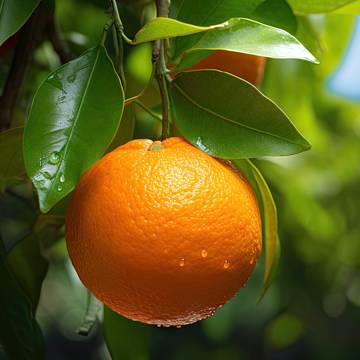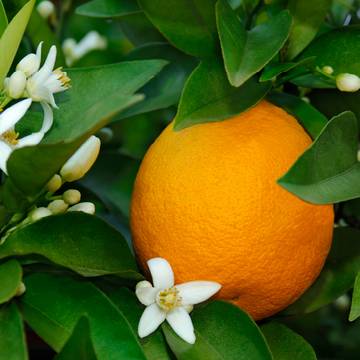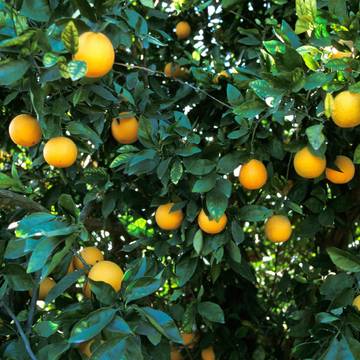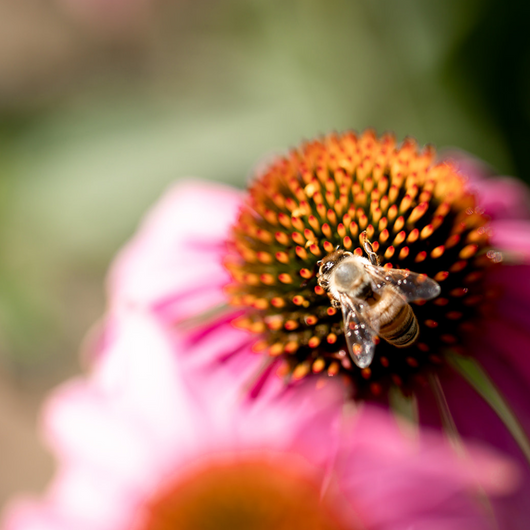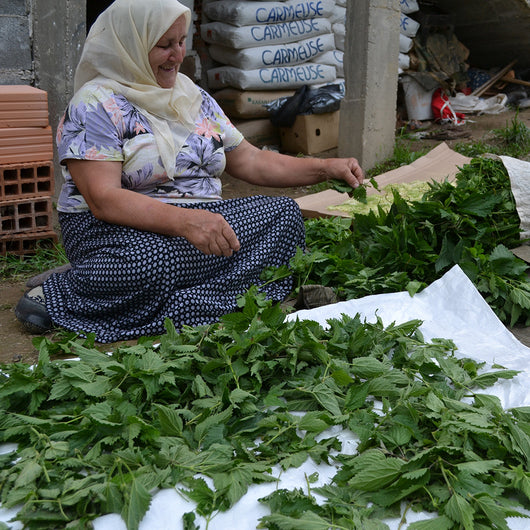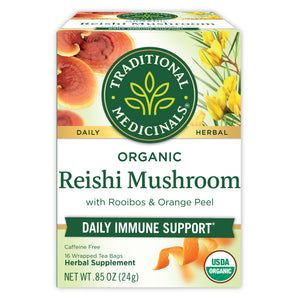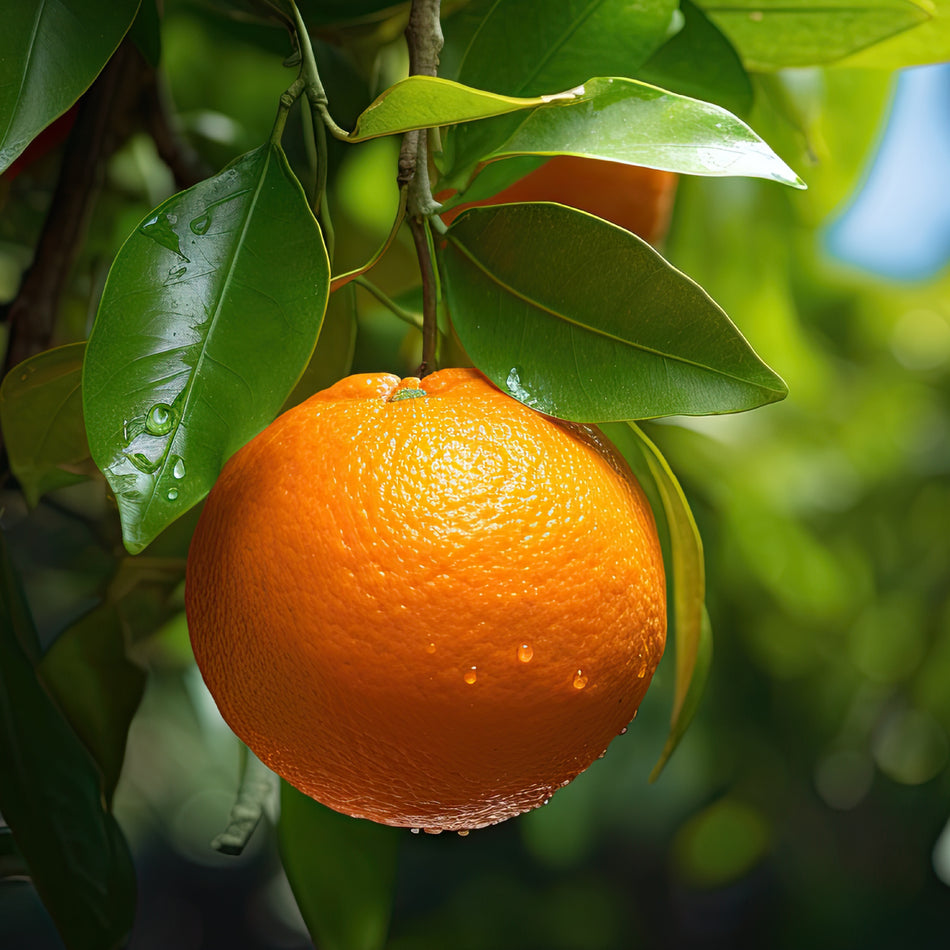
Orange
Citrus sinensisWhile the iconic spherical orange may best be known for its aromatic allure and epicurean charm, the peel of this juicy fruit can also promote healthy digestion.* In our products, we feature orange in low enough amounts to simply brighten formulas with its sweet and citrusy flavor, delivering the true taste of herbs without the use of artificial flavorings or colorings.
Discover a plant that brings luck, taste, and benefits.
What are the benefits of Orange?
Juicy, sweet oranges – also known as Citrus sinensis – are well-loved for their health benefits and refreshing taste. While most of us enjoy orange juice or fruit for breakfast, the peel is commonly used in herbalism in foods, teas, and fragrances. The zesty peel is rich in essential oils, flavonoids, and other beneficial compounds that make it an ideal (and versatile) kitchen ally.
There are countless herbal remedies with orange peel. Herbalists commonly use the dried peel in teas for its citrusy taste and to support healthy digestion. The peel's bitter and enzymatic nature stimulates the production of digestive juices and eases bloating.*
One of the easiest ways to enjoy orange peel's taste and benefits is in a tea. Simply steep a teaspoon of dried orange peel in hot water for 10-15 minutes, cover, and enjoy! Or, try it in our adaptogenic, sun-kissed-tasting tea blend Reishi Mushroom with Rooibos & Orange Peel – formulated to support the immune system and promote overall vitality.*
Folklore & Historical Use of Orange
Oranges, and orange peels more specifically, are steeped in history and cultural significance. They have been revered around the world for their health benefits, taste, and symbolism. In Traditional Chinese Medicine (TCM), the peel is used to invigorate the flow of life force, also known as qi. It is a common addition to formulas for those experiencing dampness in the body, which manifests as excess mucus or phlegm.
In Chinese folklore, citruses like oranges, mandarins, and pomelos are said to bring good luck and prosperity during the Lunar New Year. When visiting loved ones, it’s common to bring a basket of oranges for well-wishes and good fortune. For centuries, across Europe, Asia, and Africa, parts of the orange have also been added to perfumes and toiletries for its mood boosting and bright, lemony aroma.
There are also many traditional culinary uses for orange peel, such as Greek loukoumades (honey puffs), Italian panettone (sweet bread), British marmalade, and more. Natural cleaning with orange peel is also quite popular, by using the dried and ground orange rinds that are high in limonene, a powerful substance with degreasing and antibacterial properties.
Botany, Species, Habitat
Sweet oranges belong to the Rutaceae family, along with other citrus fruits and rue, and are native to Southeast Asia. They’re a hybrid between pomelo and mandarin, and the leaves, flowers, and fruit are commonly collected from the trees for use in commerce. This evergreen tree thrives in slightly acidic and well-drained soil, and in sunny regions worldwide – particularly in tropical, subtropical, and Mediterranean climates. These fruit-bearing trees are a popular choice for home gardens, as they provide fresh fruit and shade by growing up to 30 feet tall.
During commercial harvest, ripe oranges are picked, sorted, and graded based on their size, color, and sweetness. The peels are then separated from the juicy fruit, washed, and dried before they are ready to be used in teas and other preparations. To harvest orange peel at home, carefully remove the outer layer of the fruit, dry it, and then chop or grind it for use in teas, tinctures, or various culinary creations.
When To Use Orange
Before meals to support healthy digestion.
The Business of Sustainable Plants
Our business is rooted in plants, and for us, it’s a business imperative that we care for the ecosystems where these plants live and thrive. We believe that everything is interconnected, which means supporting ecosystems and the farmers and collectors who harvest and gather our herbs. Finding opportunities to reduce or eliminate emissions at the source, we support organic and regenerative farming practices as well as voluntary certifications like Organic and FairWild. These ensure the absence of pesticides, herbicides, as well as the ongoing sustainability of wild collection, and the health and livelihoods of the collectors who forage. Josef Brinckmann, Traditional Medicinals’ Research Fellow, Medicinal Plants and Botanical Supply, asserts, “Everyone has a role to play in preserving biological diversity. One way of doing that is by equitably supporting the local people to serve as stewards of the land.”
It Starts with Organic
We choose to source organic because we believe in the positive impacts it has on environmental sustainability, biodiversity, and overall ecosystem health. Organic helps us increase transparency while prioritizing consumer well-being and farmer success, which is key to producing the high-quality herbs we source. In 2021, we procured 2.73 million pounds of certified organic herbs, over 99.7% of our total botanical herbs purchased. Volumes were down slightly from FY20 due to timing of inventories received.
The impact from organic farming creates a vital ecosystem through improved soil health, water quality, pollinator habitats, and biodiversity. Organic farms also have increased carbon sequestration potential through long-term carbon storage in the soil, helping to mitigate climate change.
One of the benefits of organic that we most value is farmer health. We care deeply about the people who produce our herbs, ensuring that they are not exposed to synthetic chemicals found in conventional agriculture.
Fair Trade
We believe that everyone deserves a fair wage for hard work. That’s one of the reasons why we’re committed to fair trade. Traditional Medicinals® is a registered Fair Trade “brand holder”, “licensee” and “manufacturer,” and our products are certified by Fair Trade USA, an independent third-party certifier. We were an early adopter of Fair Trade, having launched our first fair trade tea product in 1998, just one year after Fairtrade International (FLO) was established. We continue to work closely with our network of producers to help them to implement fair trade standards and get certified.
Reishi Mushroom with Rooibos & Orange Peel Tea
Additional Information
Legal Disclaimer
The information and other content in this article is designed to provide a general overview of the botany, cultural history, and traditional uses of this herb. It is not intended and should not be construed as health advice. Every person is unique and you should consult with your health care provider before using any herbal product or supplement.

